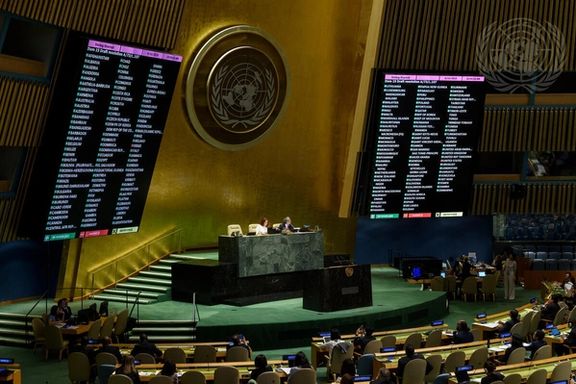Tehran, Ottawa Trade Barbs As UN Condemns Iran Over Human Rights

Iran slammed a critical human rights resolution passed by United Nations General Assembly Thursday, accusing Canada and the United States worse of violations.

Iran slammed a critical human rights resolution passed by United Nations General Assembly Thursday, accusing Canada and the United States worse of violations.
Speaking to reporters, Kazem Gharibabadi, secretary of Iran's High Council for Human Rights, said the resolution was "full of baseless claims" while human rights were extensively violated in Western countries.
He cited Canada, the countrythat drafted the resolution, which was co-sponsored by Israel and the United States. The discovery of mass unmarked graves of 1,200 indigenous children in Canada has highlighted the state’s forced separation from parents of 150,000 children from mid-19th century to 1980.
The resolution adopted by UNGA Thursday, 78-31 with 69 abstentions, expressed serious concern at the "alarmingly frequent" use of the death penalty, including against juvenile offenders, torture, and arbitrary arrests in Iran.
It highlighted "torture or other cruel, inhuman or degrading treatment or punishment," which it said might include sexual violence as well as serious restrictions of the rights to freedom of peaceful assembly and association, and arbitrary arrests.

Gharibabadi, who is also the judiciary’s international relations deputy, said Iran's laws on torture were stricter than the UN Convention Against Torture. Iran is not a signatory to the UN convention, although Canada is.
Gharibabadi said that the Iranian legal system offered the chance of redress. "We have said repeatedly, anyone who claims to have been tortured should take their case to the authorities designated by the judiciary and the High Council for Human Rights and we will seriously follow it up," he said.
Although Iran often cites violations in Western countries as an indirect way to defend itself,
The resolution adopted by UNGA Thursday expressed serious concern at the "alarmingly frequent" use of the death penalty, including against juvenile offenders, torture, and arbitrary arrests in Iran. Human rights organizations and United Nations experts have called on Iran to end executions, especially those of juvenile offenders such as Arman Abdolali who was executed November 24 murdering his girlfriend when he was under 18. Iran has had the second highest rate number of death-penalty executions in the world, after China.
The resolution also urged Iran to release anyone detained solely over peaceful protests, and called for an end to “reprisals” against “human rights defenders,” protesters and their families, journalists, and individuals who cooperated with the United Nations “human rights mechanisms."
Twenty-three rights groups including international organizations recently said the “international community” should urge Iran to free activists detained “arbitrarily” including three arrested in Augustwhile planning to sue Supreme Leader Ali Khamenei.
Iran’s delegate to the UN, Zahra Ershadi, in November said Canada’s resolution exposed a "deliberate policy of incitement to Iranophobia,” violated the UN "principles of non-selectivity and impartiality," and undermined cooperation and dialogue on human rights.
Ershadi said the resolution's co-sponsors − the US, Israel which she called “the child killer Israeli regime,” and Canada − were the "main proponents of racism, occupation, and abhorrent treatment of indigenous peoples." The sponsors were scoring political points by instrumentalizing human rights, she said.
Although Iran often cites violations in Western countries as an indirect way to defend itself, the issue is that there is little recourse for victims in Iran, while citizens can openly seek redress through independent courts in Western countries. There is also tight control over media in Iran and intimidation of journalists that make publication of news about violations difficult.
The growth of social media in recent years has helped expose many violations in Iran.